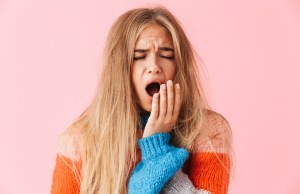Imagine this: You wake up, get out of bed, get dressed, make yourself breakfast, and head to work. You go through your daily routine, but something feels off. Activities that once brought you joy no longer spark the same happiness. Everyday chores like washing dishes, laundry, or watering your plants start to pile up. You find yourself socializing less than you used to. Yet despite these changes, you’re still able to manage your responsibilities and keep your life on track.
This scenario illustrates what many refer to as high-functioning depression, sometimes called functional depression.

What Is High-Functioning Depression?
High-functioning depression is a term used to describe people who meet the criteria for a depressive disorder but continue to manage daily responsibilities and maintain outward appearances.
The informal term is often used to describe someone whose ability to work, study, or care for themselves remains relatively intact, even as they struggle with symptoms of depression like persistent sadness, low motivation, or loss of interest in once-enjoyed activities. These symptoms are present and impactful, but they may not be as visibly debilitating as those seen in more severe depressive episodes.
While “high-functioning depression” is not an official clinical diagnosis, it aligns closely with persistent depressive disorder (PDD), a chronic condition characterized by milder but enduring depressive symptoms lasting at least two years.
Sometimes, the term “high-functioning” when used to describe people with depression can feel stigmatizing. It implies that because their symptoms are less visible, they must be struggling less or are better equipped to manage their condition. However, regardless of whether someone is considered “high-functioning” or not, depressive symptoms are real and deserve care and support to heal and improve.
What Does High-Functioning Depression Look Like in Daily Life?
You might maintain productivity at work, keep your home organized, or socialize occasionally—all while battling persistent sadness, emotional numbness, or a hollow sense of “going through the motions.” Externally, your life may appear stable, but internally, you could feel drained by self-criticism, guilt, or the exhausting effort to “act normal.”
This discrepancy between outward functionality and inner struggle doesn’t mean your pain is less valid. Treatment—whether therapy, medication, or lifestyle changes—can help restore balance. You don’t need to “prove” your struggle through visible collapse to deserve care.
High-Functioning Depression vs. Major Depression: What’s the Difference?
As mentioned, “high-functioning depression” is not a clinically diagnosable condition but rather a different way depression can present itself, with the same symptoms and impact on mental health. Because of this different presentation, high-functioning depression often looks different from the more typical experience of major depression.
Here are a few key ways these two forms of depression differ:
- Functionality:
-
- Major depression often causes severe impairment in daily life. People may struggle to work, socialize, or complete basic tasks. This can lead to messy living spaces, difficulty maintaining relationships, and work piling up over time.
- High-functioning depression looks different. People with this form can still manage their daily responsibilities like work, relationships, and self-care. They still experience persistent sadness and low motivation but are able to keep up appearances.
- Duration:
-
- Major depression episodes typically last two weeks or more, with possible breaks between episodes. If symptoms persist for two years or longer, the diagnosis may shift to persistent depressive disorder (PDD).
- High-functioning depression is often linked to PDD, meaning symptoms can last for years. Because of this chronic nature, people may become accustomed to their symptoms and mask their struggles, making them less obvious.
- Visibility
-
- Symptoms of major depression are usually visible and debilitating. People may withdraw socially, neglect hygiene, or become irritable, which others can notice.
- Those with high-functioning depression often hide their symptoms behind a facade of competence. They may appear “fine” externally, while internally experiencing deep sadness, emptiness, or hopelessness.
Though high-functioning depression can often involve milder symptoms, making them slightly easier to conceal, this is not always the case. “High-functioning” individuals can be dealing with any level of symptom severity, mild to severe, which is why it’s incredibly important to seek help from a mental health professional if you’re facing these issues.
Why Some People Appear High-Functioning
One reason individuals with depression may seem “high-functioning” is if they have persistent depressive disorder (PDD)—a chronic, low-level depressive condition also called dysthymia. Unlike major depressive disorder (MDD), PDD involves persistent symptoms that last for years, though they are often less severe. However, PDD significantly increases the risk of developing MDD later in life.
Because PDD symptoms remain consistent over months or years, people often adapt to functioning around them. This can make their depression less visibly disruptive, creating the illusion that their daily performance is unaffected, even though they continue to experience symptoms internally.
The Hidden Risks of High-Functioning Depression
The term “high-functioning” can obscure depression’s severity, leading to misdiagnosis or underdiagnosis. Since diagnosis often hinges on visible impairment in daily life, people who maintain routines despite internal struggles may not receive proper care. This delays critical treatment and leaves symptoms unaddressed.
Lack of external support compounds the issue. When someone appears to function normally, mood or sleep changes may be dismissed as temporary. Loved ones might not recognize their need for help, forcing them to endure depression alone.
Chronic burnout and emotional strain often result. Without treatment or support, high-functioning individuals frequently face exhaustion, irritability, and persistent low mood, masking a worsening condition.
How Do You Know If You Have High-Functioning Depression?
If everyday tasks like work or socializing feel exhausting yet you’re still managing to keep up with responsibilities, you might be experiencing high-functioning depression.
Unlike classic depression, which often makes it hard to leave bed or maintain routines, high-functioning depression lets you “fake it” outwardly. You’ll likely recognize the same symptoms—sadness, low energy, irritability, or numbness—but they’ll feel more like a constant undercurrent than a visible collapse. The real struggle happens internally: You might feel like you’re running on fumes while others see someone who “has it all together.”
If this sounds familiar, consider talking to a mental health professional. They can help unpack whether what you’re feeling aligns with depression and talk you through treatment options.
Treatment Options for High-Functioning Depression
The best way to treat high-functioning depression is the same as standard depression: Seek the help of a mental health professional. Therapists and psychiatrists who specialize in depression can help you identify symptoms, create a personalized treatment plan, and equip you with tools to effectively manage your symptoms.
While high-functioning depression may appear less disruptive externally, it requires the same compassionate care as any form of depression. Treatment typically involves:
- Therapy: Cognitive-behavioral therapy (CBT) to reframe negative thought patterns or psychodynamic therapy to explore emotional roots.
- Medication: Antidepressants like SSRIs or SNRIs, prescribed under medical guidance.
- Lifestyle adjustments: Mindfulness practices, exercise, and other strategies to build mental resilience.
The bottom line: Depression is depression. Whether you’re “high-functioning” or not, professional help ensures you don’t have to navigate it alone.













